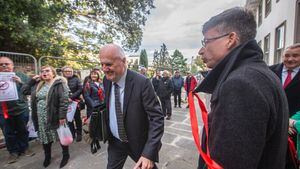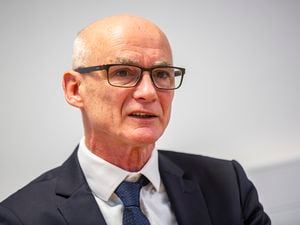Islanders ‘will pay price for lack of investment’, warns industry body
Guernsey people will suffer direct and indirect consequences of a lack of investment in infrastructure, health and education, the island’s leading industry group has warned.

The Guernsey International Business Association, the senior industry body for the island’s financial services sector, said that failing to act in sorting government finances ‘could have adverse commercial, economic and social consequences’.
‘The absence of investment in infrastructure, health and education alone will have severe direct and indirect consequences on the lives and prospects of the people of Guernsey with long-term ramifications,’ Giba said in a statement issued on the morning the Funding and Investment Plan debate started, after deputies had run the gauntlet of a much-reduced number of protesters compared to the Tax Review meeting earlier this year.
The island’s finance industry generates almost 40% of its GDP and provides employment for some 7,000 islanders. The association said the sector had grown on the basis of tax, regulatory stability and certainty.
‘So Giba supports measures which seek to redress the deficit with a clear and timely plan on the implementation of tax reforms.’
It said it accepted the need to raise more money, both through a mitigated consumption tax and increased contributions from businesses, and economies from within the public sector. It rejected changes to the corporation tax regime, however.
Giba said that the proposals from Policy & Resources ‘contain a combination of elements that offer a sound basis on which to move forward’.
Listen to our 'Shorthand States' round-up from day one of the debate, with Simon De La Rue and Matt Fallaize
One option which will not go forward is the latest proposal from the self-styled ‘Fairer Alternative’, whose amendment, lost only on a tied vote at the Tax Review debate, was defeated by 24 votes to 16.
Its leader, former P&R vice-president Heidi Soulsby, said that she was not surprised to have been defeated.
‘My concern is that we end up with nothing,’ she said. ‘We did try. Voting everything down would have been the easy thing to do. We had to put forward a credible alternative, which I think it was.’
She said that she had tried to work with the senior committee on a workable solution, which had not been taken up, and now she said she could not support P&R’s options, particularly the committee’s favoured approach, including significant borrowing, which she described as being ‘very high risk’.
‘P&R haven’t really listened. They’ve produced scenarios no more appealing than February, in fact worse. One minute it’s our ageing population that’s the concern, now it’s were under-invested on capital and we’ve got to spend it now.’
Debate continues on other amendments, with States members facing the prospect of meeting into the weekend, but Deputy Soulsby said that other amendments ‘all have issues – and some have unintended consequences’.





